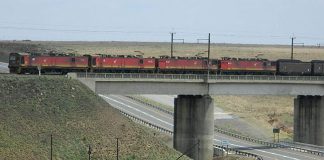Although exploration for shale gas is important for the country’s economy, it should only be allowed on condition that the fracking companies do not use harmful chemicals in their test wells. This is according to geo-hydrologist Prof Gerrit van Tonder of the University of the Free State’s Institute for Groundwater Studies, who no longer supports hydraulic fracturing (fracking) for shale gas in the Karoo.
“We still have another 10 years before any well field actually starts producing. By that time the energy companies should have developed more environmentally friendly fracking fluids,” said Van Tonder. “Ideally, however, High Volume Slickwater Fracking – the method used in horizontal drilling where chemical mixtures are forced into rock formations to free the gas – should be banned. In France, 62 companies are already exploring for gas without using fracking,” he said.
Very little is known about the fracking fluids currently in use, he added. For example, the injected concoctions may contain compounds that can dissolve and release radio-active elements from the shale rock. “And at a depth of 4km and temperatures of 140°C, the fracking chemicals are sure to undergo physical changes.”
Hard evidence
Van Tonder and colleague Fanie de Lange recently released what they describe as ‘hard evidence’ that polluted fracking water will surface not while the wells are producing gas, but some time thereafter. “Because groundwater in the Karoo basin tends to flow upwards from the deep layers, contaminated water can reach potable aquifers via natural pathways such as dykes, but will most likely be present in exhausted, abandoned wells,” they said. “The process could take anything from 20 years to thousands of years, but could unexpectedly lead to serious water pollution.”
Diamond bonaza
”The fracking companies argue that they can kill wells at the end of a gas field’s lifetime by cutting off the casings at a certain depth and sealing them off with bentonite. I don’t believe them because they don’t do it in the US yet,” he said. In his view, the SA government can’t ignore the latest research. “Even Shell has indicated interest. Imagine the costs to a fracking company should it be held responsible for the pollution in 50 years from now.”
Van Tonder also said that kimberlite pipes are included in the Karoo basin’s unique geology. “These are cut off by dolerite sills but could also act as preferential flow pathways for rising water as a result of horizontal fracking,” he said. “On the other hand, these pipes offer a possible bonanza in that fracking could uncover diamonds under the dolerite sills.”
Too important
The study has been criticised because it wasn’t peer reviewed, but Van Tonder believes their findings are so important – especially in light of government’s possible lifting the fracking moratorium within the next two months – it was necessary to release them immediately. “It takes at least nine months to get a scientific paper published in a peer reviewed journal,” he said.
Shell replies
Referring to the University of the Free State’s research paper warning that fracking fluids will contaminate the Karoo’s freshwater aquifers by rising along preferred pathways, including dykes, Janine Nel, public relations officer responsible for Shell South Africa said Shell was looking into this theory.However, at this stage of its analysis, Shell disagreed with the Free State study model, which assumed a well depth of 1 500m.
“This is not representative of Shell acreage – 80% of our wells have an average depth of more than 2 500m,” she said.
“A single vertical dyke of 1 500m is highly improbable (even less probable for 2 500m) based on current dolerite ring models where vertical dykes are less than 1 000m.” Shell would eventually frack only a tiny portion, around 1%, of the total licence area (about 900 000ha) it has applied for in the Karoo, she said.











